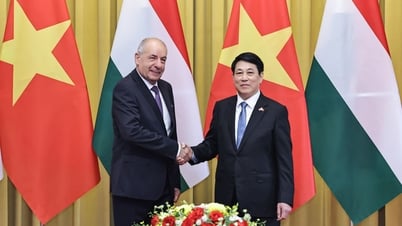US-EU trade tensions
US President Donald Trump has just made a controversial statement about the European Union (EU). On May 12, during a press conference at the White House, Mr. Trump said that the European Union is “worse than China”, criticizing the bloc for its trade practices with the US.
According to Mr. Trump, the EU "treated unfairly" the US by "suing all of our companies, including Apple, Google, Meta".
Mr. Trump's statement came just hours after Washington and Beijing reached a temporary agreement to reduce reciprocal tariffs for 90 days (from 145% to 30% for Chinese goods and from 125% to 10% for American goods).
The US-China deal helps cool down the trade war between the two powers and creates conditions for further negotiations.
Instead of strengthening relations with the EU, Mr. Trump has criticized Brussels, accusing it of unfairly treating the United States in auto and agricultural trade and suing American technology companies.
Mr. Trump also emphasized that the US “has all the leverage” and expressed his expectation that the EU will make concessions. According to Politico , Mr. Trump is looking to force the EU to loosen regulations and open its market more to US goods, especially cars and agricultural products.
On the EU side, Brussels has made some concessions, such as easing regulations and cooperating to curb overproduction from China.
However, the EU appears ready to impose retaliatory tariffs if negotiations fail, with the value of goods expected to be hit at €95 billion. European Commission President Ursula von der Leyen has taken a tough stance, saying she would only meet with Mr Trump if there was a concrete trade package.
President Donald Trump unexpectedly criticized the European Union. Photo: Politico
The US-EU trade relationship has long been seen as a cornerstone of the global economy , with annual bilateral trade worth around $1 trillion, focusing on high-tech, automotive, pharmaceutical, financial and agricultural processing industries. However, under US President Donald Trump, the relationship has encountered many storms.
During his first term (2017-2021), Mr. Trump applied an “America First” policy, focusing on reducing the trade deficit and protecting domestic industries. One of the most controversial moves was the imposition of a 25% tariff on steel and a 10% tariff on aluminum imported from the EU in 2018, which were later removed under Mr. Joe Biden.
The US and the EU have also had a long-standing dispute over subsidies for Airbus and Boeing, and the EU's plan to tax US tech giants like Google, Apple, and Meta. Mr. Trump considers this tax to be discriminatory against US companies.
Despite rising trade tensions, the US and the EU remain strategic allies, sharing interests in maintaining the global economic order and dealing with challenges from China. Both work closely on controlling high-tech exports and restricting China’s strategic investments in sensitive sectors such as semiconductors and green technology.
However, Mr. Trump's protectionist policies are said to be putting pressure on this alliance, raising concerns about disagreements that are difficult to heal in the short term.
What are the US and EU concerned about in the context of competition with China?
Despite his harsh criticism of the EU, Mr. Trump and the United States are facing many challenges as competition with China becomes increasingly fierce.
As one of the three largest trading partners of the US, a full-blown trade war with the EU could cause major damage to the US economy. Retaliatory tariffs from the EU could increase the price of US goods, from agricultural products to technology, directly affecting US consumers and businesses.
According to the Bruegel expert group, the US-EU trade war could reduce the GDP of the US and EU by 0.7% and 0.3% respectively by 2025.
Furthermore, US industries are heavily dependent on global supply chains, in which the EU plays a key role. For example, the US auto industry imports components from the EU, and high tariffs could disrupt supply chains and increase production costs. This is particularly worrying as the US tries to reduce its dependence on China in areas such as semiconductors, batteries and green technology.
If the EU responds by restricting exports of strategic raw materials, the US could face serious shortages.
In addition, escalating tensions with the EU could weaken the US’ geopolitical position in competition with China. The US and the EU share a common goal of reducing dependence on China in strategic industries and limiting Beijing’s influence. Both have coordinated to control the export of semiconductors and AI technology, and imposed sanctions on Chinese companies such as Huawei, ZTE, etc.
However, trade tensions between the US and the EU could affect the level of coordination between the two sides in some strategic areas.
China is currently the EU’s largest trading partner. If the US continues to apply pressure, the EU may seek to strengthen economic ties with Beijing to offset the damage. This would undermine the US strategy of isolating China economically and technologically.
Mr Trump’s protectionist policies, while popular with some voters, have been criticised for raising prices and causing economic instability. Opening a new trade front with the EU, after reaching a deal with China, could increase pressure from US businesses.
Not to mention, a trade war with an EU ally could erode America's reputation in the international arena, causing other partners to doubt Washington's reliability.
It can be seen that Mr. Trump's strategy is often to exert maximum pressure to gain concessions from countries. But clearly, a prolonged trade war with the EU will cause great losses for both sides, especially in the context of increasing competition with China. Mr. Trump's pressure tactics have many potential risks, not only in terms of the economy but also in terms of alliance relations.
So can the US and EU overcome tensions to maintain their strategic alliance, or will they fall into an endless confrontation? The answer depends on the upcoming negotiations.
What does it signal when Trump signs his first bilateral trade deal? This is the first agreement signed under the Trump administration's "bilateral negotiation" trade strategy, opening up opportunities for the US to reshape the global trade order. However, this also raises many concerns.
Source: https://vietnamnet.vn/ong-donald-trump-lo-ngai-dieu-gi-nhat-khi-gay-gat-voi-chau-au-2400800.html


![[Photo] Close-up of the project connecting 3 key highways in the South](https://vphoto.vietnam.vn/thumb/1200x675/vietnam/resource/IMAGE/2025/5/28/c4b0bc977e964bb79d08b4e836974495)
![[Photo] President Luong Cuong holds talks with Hungarian President Sulyok Tamás](https://vphoto.vietnam.vn/thumb/1200x675/vietnam/resource/IMAGE/2025/5/28/0f603676be6444aa9f52d4bd32582b4d)
![[Photo] National Assembly Chairman Tran Thanh Man meets with Hungarian President Sulyok Tamas](https://vphoto.vietnam.vn/thumb/1200x675/vietnam/resource/IMAGE/2025/5/28/1f182464bad54d399e1236943e0c13ba)

![[Photo] General Secretary To Lam receives Hungarian President Sulyok Tamas](https://vphoto.vietnam.vn/thumb/1200x675/vietnam/resource/IMAGE/2025/5/28/58cdfabf66514ef4bce5a13a285e6f6f)
![[Photo] Welcoming ceremony for Hungarian President Sulyok Tamas and his wife on an official visit to Vietnam](https://vphoto.vietnam.vn/thumb/1200x675/vietnam/resource/IMAGE/2025/5/28/7956bacf4a3e4bde8326cb8f72a3b26c)




















![[Photo] Hungarian President and his wife take a walk and enjoy the view of Hoan Kiem Lake](https://vphoto.vietnam.vn/thumb/1200x675/vietnam/resource/IMAGE/2025/5/28/b9c83fbe6d5849a4805f986af8d33f39)

























![[Case Study] VIMC – 30-year journey of overcoming waves and reaching far](https://vphoto.vietnam.vn/thumb/402x226/vietnam/resource/IMAGE/2025/5/28/ac45a93a62884eec85471e6c89ef521a)






































Comment (0)